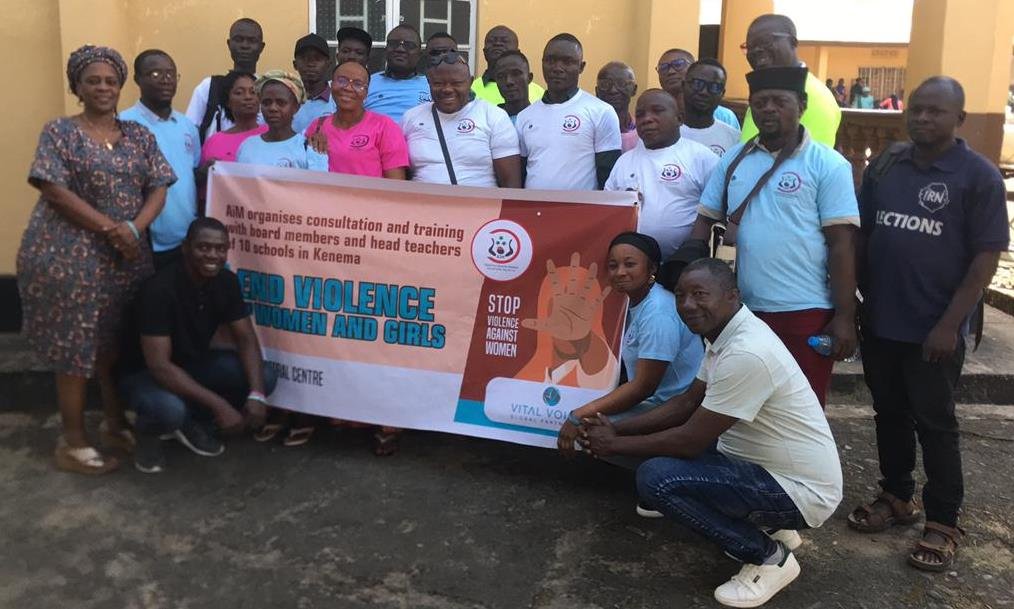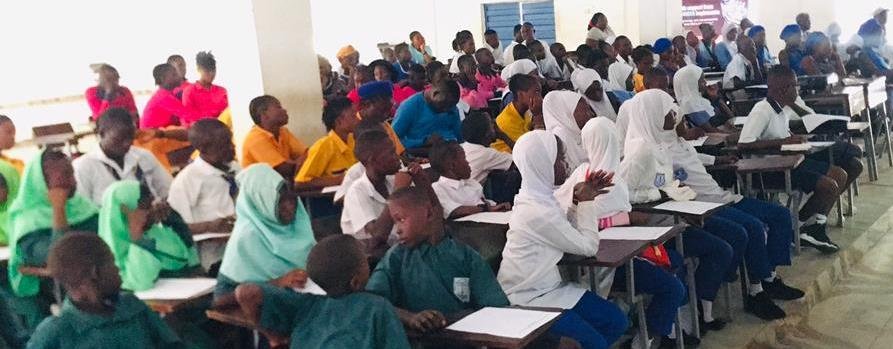By Ragan M. Conteh
In its ongoing effort to build a unified movement to end Female Genital Mutilation (FGM) in Sierra Leone, the Amazonian Initiative Movement (AIM-SL) has concluded series of consultations and training sessions among participants in Kenema District.
The initiative included a one-day workshop for school board members, school management committee (SMC) members, and heads of schools, as well as a separate training for 100 school pupils and 10 teachers from various institutions in the district.
The aim of these sessions is to establish school-based clubs of influence in Kenema District to combat FGM and promote gender equality. The initiative’s theme, “End Violence Against Women and Girls”, is tied to the project titled “Empowering Teenage Girls and Communities to Stand Up Against FGM in Sierra Leone.”
The workshops, funded by Vital Voices Global Partnership, took place at the Eastern University Conference Hall.
A Call for Change
 During her presentation, Madam Rugiatu Turay, Director of AIM-SL and Chairperson of the Forum Against Harmful Practices (FAHP), thanked stakeholders and students for their participation. She highlighted the severe and often lifelong physical, psychological, and economic consequences faced by girls and women subjected to FGM.
During her presentation, Madam Rugiatu Turay, Director of AIM-SL and Chairperson of the Forum Against Harmful Practices (FAHP), thanked stakeholders and students for their participation. She highlighted the severe and often lifelong physical, psychological, and economic consequences faced by girls and women subjected to FGM.
“Girls and women who undergo FGM face a range of dangerous and distressing consequences.
Many suffer lifelong negative impacts that affect their physical, emotional, and economic well-being,” she said.
Madam Turay explained that the harmful effects of FGM extend beyond individuals, impacting households, communities, and even national economies. In extreme cases, girls die from complications such as hemorrhage, septicemia, tetanus, or HIV, often due to the use of unsterilized tools.
 She urged parents and communities to abandon FGM, thus emphasizing that together, they can protect future generations from enduring such ordeals.
She urged parents and communities to abandon FGM, thus emphasizing that together, they can protect future generations from enduring such ordeals.
“If women discuss their experiences openly and sincerely with their husbands, we can collectively decide to protect our girls from undergoing this harmful practice,” Turay stressed.
FGM’s Broader Impacts’ unit, Turay also raised concerns about the rising prevalence of HIV/AIDS among women and Sierra Leone’s high infant mortality rate.
“Our country has one of the highest infant mortality rates globally. Medical professionals must address this issue with sincerity,” she said.
She further highlighted the link between FGM and obstetric complications, such as obstructed labor, which often leads to cesarean sections and sometimes results in loss of firstborns.
Additionally, Turay called for greater monitoring of Maternal and Child Health (MCH) aides, some of whom are allegedly involved in performing FGM.
“Our medical and health personnel should focus on preserving lives, not promoting harmful practices,” she asserted.
Challenging Myths Around FGM
Addressing common misconceptions, Turay debunked the belief that FGM promotes cleanliness or prevents promiscuity.
“Cleanliness in women has nothing to do with being cut or uncut. Similarly, cutting a woman’s clitoris does not prevent promiscuity, as we are often led to believe,” she argued.
Turay urged participants to consider the teachings of religious texts, thus emphasizing that FGM contradicts the principles of Islam and Christianity.
“FGM is like telling God He made a mistake in creating women. The clitoris has a purpose, and God intended for sex to be enjoyed,” she explained.
She added that many marriages suffer due to the sexual dysfunction caused by FGM, as women often experience pain rather than pleasure during intimacy.
A Call to Religious and Political Leaders
Turay appealed to religious leaders and medical professionals to speak out against FGM practice.
“Our religious leaders and medical personnel must act to save lives—physically, spiritually, and emotionally. They don’t need votes; they need to protect lives,” she said.
She encouraged participants to engage politicians, urging them to acknowledge the dangers of FGM and advocate for its eradication.
Participants Commit to Change
The workshops concluded with participants-including board members, teachers, and students—expressing gratitude for the education provided and pledging their support toward anti-FGM movement.
“This training has shown us the importance of abandoning harmful practices,” one participant remarked.
Participants also called for more training sessions to strengthen the campaign and ensure that this message reaches a wider audience in Kenema District.
































































































































































































































































































































































































































































































































































































































































































































































































































































































































































































































































































































































































































































































































































































































































































































































































































































































































































































































































































































































































































































































































































































































































































































































































































































































































































































































































































































































































































































































































































































































































































































































































































































































































































































































































































































































































































































































































































































































































































































































































































































































































































































































































































































































































































































































































































































































































































































